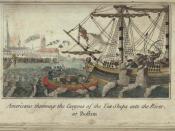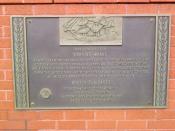The American Revolution put an end to the long term British rule over American Colonies and allowed for the formation of the United States of America. Years of frustration within the colonies towards British Parliament led to the vilification of Britain and its rule over the colonies. British actions and responses to colonist's growing aggravation may seem to be justified, yet they were unfair, and the disputing views and disagreements are what fuelled the revolution.
The American Revolution was a result of years of unhappiness within the colonies. "No Taxation without Representation," was the driving idea explaining the unfairness of the situation with the colonists (Lecture). "It is inseparably essential to the freedom of a people and the undoubted right of Englishmen, that no taxes be imposed on them but with their own consent, given personally or by their representatives (103)." The colonists felt that Britain was being unfair because they were imposing taxes on the colonies and yet they had no representation in Parliament.
Britain on the other hand felt they had every right to act the way they did. Tensions mounted for years. Taxes were placed, and removed, and placed again. The colonists then boycotted British goods claiming that only their colonial assemblies could impose taxes on them, not Parliament.
Britain saw themselves as the "parent or mother country" and therefore felt that British government, especially parliament, had the constitutional power to levy taxes on their colonies (109). They put taxes such as the Stamp Act, Townshend Acts, Tea Act and Intolerable Acts in place for two major reasons; firstly, after the French and Indian war, Britain was in debt and needed money desperately, and secondly, some acts were put in place in order to maintain British troops within the colonies. The Stamp act required that a...


